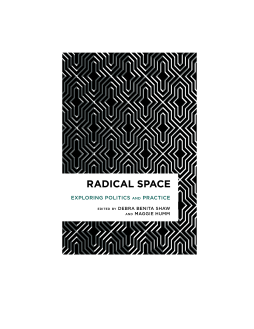
Additional Information
Book Details
Abstract
The spatial turn in the Humanities and Social Sciences has produced a considerable body of work which re-assesses space beyond the fixed Cartesian co-ordinates of Modernity and the nation state. In the process, space has been revealed as a productively contested concept with methodological implications across and between disciplines. The resulting understandings of space as fluid, changeable and responsive to the situation of bodies, both human and non-human has prepared the ground for radical concepts and uses of space with implications for how we conceive of contemporary lived reality.
Rather than conceiving of bodies as constantly rendered docile within the spaces of the post-industrial nation state, Radical Space reveals how activists and artists have deployed these theoretical tools to examine and contest spatial practice.. Bringing together contributions from academics across the humanities and social sciences together with creative artists this dynamically multidisciplinary collection demonstrates this radicalization of space through explorations of environmental camps, new explorations of psychogeography, creative interventions in city space and mapping the extra-terrestrial onto the mundane spaces of everyday existence.
Mixing analysis with art and activism, 'Radical Space' presents a collection of insightful, engaged and provocative papers well attuned to our uneasy and unpredictable times. The book manages to be both serious and playful, as the contributors explore new approaches to existing, emerging and imaginable spaces. It is often thought provoking, sometimes inspiring and only occasionally infuriating. Make time to read it.
James Donald, Professor of Film Studies, UNSW
Debra Benita Shaw is a Reader in Cultural Theory at the University of East London.
Maggie Humm is an Emeritus Professor of Cultural Studies at the University of East London.
Useful for all who have teaching and research interests in the spatial, and the relationship between theory and practice, this text will particularly appeal to those who appreciate the tradition of British Cultural Studies, as defined by the Birmingham School, whilst engaging in its multi-disciplinary contemporary debates... [W]ith its conscious positioning away from certain theoretical elements, and focus on practice and activism, Radical Space makes an important contribution to work on the spatial and political, taking a refreshing slant.
Table of Contents
| Section Title | Page | Action | Price |
|---|---|---|---|
| Contents | 9 | ||
| List of Figures | 11 | ||
| Acknowledgements | 13 | ||
| Introduction | 15 | ||
| Part I: Art, Public Space and the Body | 29 | ||
| 1 The Peterborough Child and Joanna Rajkowska | 31 | ||
| 2 Contemporary Curatorial Practice and the Politics of Public Space | 49 | ||
| 3 The Alternative Urbanism of Psychogeography in the Mediated City | 67 | ||
| 4 Radicalising Institutional Space | 93 | ||
| Part II: Heterotopias | 113 | ||
| 5 Return to Battleship Island | 115 | ||
| 6 Contested Spaces/Radical Places | 137 | ||
| 7 Radical, Ethical Spaces | 157 | ||
| Part III: Extraterritorialities | 173 | ||
| 8 Composting Space | 175 | ||
| 9 Mapping the Contours of Vectoral Space | 185 | ||
| 10 Gravity, Gender and Spatial Theory | 209 | ||
| Afterword | 225 | ||
| Index | 237 | ||
| About the Contributors | 247 |
